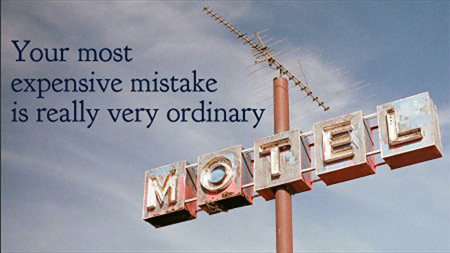Imagine that your website copy were employees. They are there to help you out, to share the load, and to convert browsers to buyers. So how are they doing? If you were to evaluate their performance, you might look at your website analytics and check out your bounce rate, your exit pages, and ‘time on page’ statistics.
And like all workplaces, you’d probably find, after a bit of sniffing around, a lot of dead wood. You know the types – they’re the ones who are chatting with Stephanie in the kitchen, holding fort about their amazing weekend shenanigans. They’re not big on new ideas and are very good at undermining the confidence of those who’ve argued for change. They’re talented at maintaining the status quo. They’re putting in time, but they’re not really there. They’re popular but with no real discernable talent, ambition, or joie de vie.
These are your words.
I’m talking about phrases such as:
“take things to the next level”
“kick arse/kick butt”
“our customer service is second-to-none”
“best practice”
“the best/first…”
“Australia’s favourite”
These words are squatting in your marketing materials, taking up space with a whole bunch of blah-blah-blah. And this list is not exhaustive. I’m talking about any words or phrases that are so common that they’ve become invisible.

Website words: the great disappearing act
Think about the colour blue in a sea of blues. Or words and phrases that you see everywhere. Think about the last networking event you attended that turned out to be filled with business owners offering exactly what you offer. Wasn’t much fun, right?
If you want to be seen and heard, you need to stand out. You need to be the only X in a room full of Ys.
People don’t buy broken records, so stop stealing the words of your competitors and the phrases which others in your industry use – it doesn’t make you sound professional, it makes you invisible.
Do the unexpected with your website copy
If most businesses in your industry are formal, be irreverent. If your colleagues look like a circus act, be the only person in the industry who wears a suit. If everyone is offering ‘package A with L, M and N’, you need to offer ‘package 21, with 6, 7, and 8.’
Stop watching your colleagues so closely. Take inspiration from a different industry (or three). You want to be the one that others copy, not the one doing the copying.
Website copy writing that sells
When I (delicately) point out to clients where their sales page copy lets them down, most respond, “but people are purchasing.”
Those who purchase are your tried-and-true clients who know exactly how fabulous you are and are confident you’re going to deliver a wowing program/event/service. They’re buying regardless of how crappy your sales copy is. They don’t need convincing.
But what about everyone else? What about the web visitors whose eyeballs you’ve paid for through your online advertising, to read your copy? How about the careful types, who are right now comparing and contrasting their various options and weighing up your words in relation to your competitors’? What about the random person on social media who clicked your link and ended up on your sales page? Are they purchasing?
Those are the people who are standing between making the sales you’ve always made, and the sales you want to make. Those are the eyeballs that are determining whether you keep earning at the level you’re at, or the level you want to be at.
Words are expensive
Your sales pages (that’s any page with a dollar sign on it) are designed to sell. They do that through words. These words are expensive. They should be. They’re the employees that you would do anything for – give them a raise, time off with their family, hell, buy them a wedding dress if they hinted at it.
These words work hard for you. These words are behind that old “make money while you sleep” promise. They can do that for you, but only if you work them. Words are important. Invest in them.
Learn how to write like a pro – check out my upcoming Blogging for Business courses across Australia.





